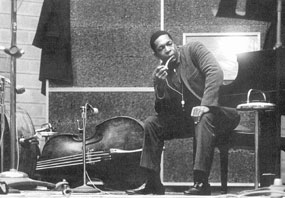|
On Prestige & Blue Note The Atlantic Years The Impulse Years Coltraneís ten year creative stretch from 1957 (the year of his first album as a leader) to 1967 (the year of his outland Interstellar Space and his death at age 41) is one of the marvels of jazz history. The power and progression of the music, and its continuing influence, is unparalleled, and to call him an inspiring figure is an understatement. The defining quality of his sax work (on tenor and soprano) is its seriousness in tone and phrasing. His playing preached the power of discipline, and although Coltrane was technique obsessed, it wasnít for showoff or ďcuttingĒ purposes. In the bop language, he wanted to get further into the changes, thus the restless harmonic subroutines and the sense of cramming in as much as possible. Modal forms allowed him to map his own paths, and the free music later in his career was really inevitable. I think what sets his free playing apart is the studious bop history that preceded it. Coltrane unfortunately inspired more than a few free players whose only goal was to ďmake noiseĒ as Trane could, but they didnít even come close to his traditional circuitry. Coltrane went the whole route. To go back to his sax tone a minute, I must admit I found him a little hard to enjoy at first, especially in comparison to saxophonists with flexible voices, like Rollins. Thereís nothing lighthearted or humorous in Traneís playing. (Iíve heard him try to be light, but even then the weight crushes down.) Coltrane was mainly interested in sequencing notes rather than ďsingingĒ or shaping them. Inflections are not really part of his repertoire, beyond the obvious stuff like the multiphonics. However, he does have a few singular sounds, like the crying tone with which he often begins or ends a phrase. You can hear it from the earliest days to the last.
By far the best book on Coltrane Iíve read is the self-titled one by Lewis Porter, who goes as far into musical analysis as he does biographical information. Itís a very scholarly book with lots of attention to detail - thank goodness, given some of the crap hippie Coltrane books Iíve read - but Porter also takes a personal tone and understanding of the music. (Which is what makes one want to get scholarly about it in the first place.) I donít think Coltrane was a saint; I donít think he was perfect; I donít think everything he played is sacred. Yet his humility and devotion to his craft is really unmatched, and a lot of his original works have an emotional power that goes beyond what one might expect from jazz or any other musical idiom. Without wanting to sound corny, I donít think listening to Coltrane makes you a better person, but I think it should make you want to be a better person.
|
